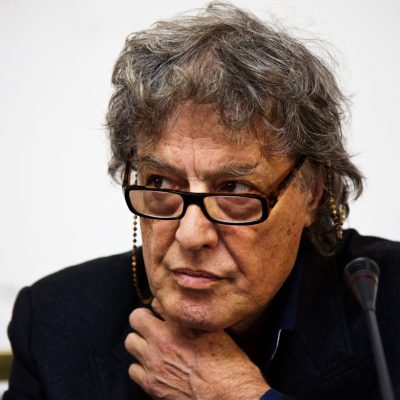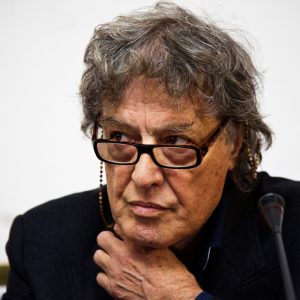25 Sep 2024 | News and features
We are writing to bring attention to the case of the visual and performance artist and master’s student, ODEE, who is being sued for damages (including legal fees likely upwards of £500,000) in the High Court in London on the 25 and 26 September 2024. The lawsuit has been brought against ODEE by Samherji, one of Europe’s largest fishing companies based in Iceland, for the unauthorised use of its website and brand.
ODEE’s art piece centres around the concept of corporate responsibility through a fictional apology – via a website he created and a mural at the Reykjavík Art Gallery – for the alleged corruption committed by Samherji to secure fishing quotas in Namibia revealed in 2019 by the whistleblower, Jóhannes Stefansson, and which quickly became known as the #Fishrot Scandal.
Samherji has exercised its rights to challenge ODEE by issuing an interim injunction to require him to take down the website with the spoof apology, and he did so in May 2023. The court will need to decide whether to vary or discharge the injunction, and whether the artist should be liable for Samerjhi’s legal costs and alleged damages. However, the question remains as to whether such action is proportionate, or an attempt to silence those who speak out against corruption.
The alleged corruption is currently the focus of a high-profile trial in Namibia in which 10 suspects have been charged including the former Ministers of Justice and Fisheries – the majority of whom have been held in custody since 2019, and who may face even longer jail terms if convicted. Investigations into Samherji’s activities are continuing in Iceland.
Ensuring that whistleblowers can disclose information about wrongdoing in the public interest is vital for democratic accountability – so that proper investigations can occur, and those responsible are held to account. Protecting whistleblowers safeguards the public’s right to know, an essential element of the right to freedom of expression.
Artistic freedom of expression – through film, theatre, literature, painting and conceptual art, among many other media – is also vital to a healthy democracy and to public discourse and the development of ideas. Artistic expression allows individuals, communities and societies to consider and examine moral and ethical choices, as well as how power works and affects us, whether it is political, social or economic.
Freedom of expression links whistleblowers and artists – individuals must be protected from the powerful who wish to stop them speaking up. Jóhannes Stefansson and ODEE deserve our support. In today’s world, where we face existential challenges to protect our natural resources, environment and climate systems, we can ill afford to let these voices be silenced.
We, the undersigned, therefore, urge Samherji to drop its disproportionate case against the artist, ODEE.
SIGNED BY:
African Centre for Media & Information Literacy (Nigeria)
Artistic Freedom Initiative (International)
Blueprint for Free Speech (International)
Daphne Caruana Galizia Foundation (Malta)
Disruption Network Lab e.V. (Germany)
Centre for Free Expression (Canada)
Civil Liberties Union for Europe
Citizens Network Watchdog Poland
Climate Whistleblowers (France)
GlobaLeaks (Italy)
Government Accountability Project (USA)
Index on Censorship (UK)
Institute for Public Policy Research (Namibia)
Justice and Environment (EU)
Oživení (Czech Republic)
Pištaljka (Serbia)
Platform to Protect Whistleblowers in Africa (PPLAAF)
Pro Publico (International)
Protect (UK)
Shadow World Investigations (UK)
Spotlight on Corruption (UK)
The Whistleblower House (South Africa)
Transparency International Ireland
Transparency International Italy
Whistleblowers-Netzwerk e.V. (Germany)
Whistleblower Chile
Whistleblowing International Network
* Protect is a registered Charity in England and Wales No.1025557
** WIN is a Scottish Charitable Incorporated Organisation No. SC048595
1 Feb 2013 | Uncategorized
A US military judge has ruled the government must dismantle a monitoring system which allowed censors to suspend the broadcast of hearings for Guantanamo prisoners suspected of planning the 9/11 attacks. Army Colonel James Pohl said on 31 January it was "the last time" a third party could decide whether the hearings would be broadcast. The closed-circuit broadcast feed was stopped for a few minutes during a 28 January pre-trial hearing of Khalid Sheikh Mohammed --- alleged organiser of the 9/11 attacks --- and four other defendants. It revealed for the first time that an unknown external force was listening in on the trial and censoring proceedings at will. The feed was cut when Mohammed's lawyer David Nevin requested the preserve secret CIA prisons where the defendants had been held before being taken to Guantanamo. Pohl, who was unsure why the information was censored as it was public information, said he and the court security officer were the only ones allowed to halt the broadcast.
An investigation into protests in Burma in November 2012 has discovered that police forces used white phosphorus to disperse crowds, causing demonstrators severe burns. Police involvement left more than 100 Buddhist monks and other participants badly burned, injuries authorities said were caused by tear gas and smoke grenades. An analysis in a Bangkok laboratory concluded that the canisters, which were collected by lawyers after the protests, contained traces of white phosphorus.
Protestors had staged an occupation at Letpaduang copper mine for 11 days before police broke up the crowd. The report will be sent to a government appointed panel fronted by opposition leader Aung San Suu Kyi for review. White Phosphorus is typically used in war to create a smoke screen and its use against people has been disputed.
An Indian state has banned a film for 15 days following complaints that it was offensive to Muslims. Tamil Nadu state in southern India banned the action film Vishwaroopam --- which was due to be released on 25 January --- after concerns that protests outside cinemas could turn violent. Muslim groups said the film portrayed their faith in a negative light and were offended that the terrorist in the film was Muslim. Tamil Nadu's Chief Minister Jayalalithaa Jayaram said the state didn't have enough police to impose law and order outside the 500 cinemas it was set to play in. Film director and co-producer Kamal Haasan has appealed for the ban to be lifted in Tamil Nadu and is expected to hear a judgement by 6 February.

Naomi Campbell has won damages after the Telegraph falsely claimed she organised elephant polo matches
On 31 January, a 15-year-old girl in Iceland won the right to keep her birth name, despite authorities saying it wasn't feminine enough. Reykjavik District Court allowed Blaer Bjarkardottir to hold on to her first name Blaer, meaning light breeze --- a name her mother Bjork Eidsdottir gave her from birth, apparently unaware the name was on the government banned list. Icelandic authorities had originally rejected the name for being too masculine, referring to her only as "girl" in communication with officials. Iceland has official rules for what name a baby can be given. Names are supposed to fit with Icelandic grammatical rules and the alphabet. The ruling means the name can now be taken by girls across Iceland.
Naomi Campbell has accepted damages from The Daily Telegraph after she was falsely accused of organising an elephant polo match in India for her partner's birthday. The newspaper had printed a story on 3 November 2012, alleging that Campbell arranged the tournament in Jodhpur for Vladimir Doronin's 50th birthday celebrations. The model accepted an apology from the Telegraph, as well as "substantial" damages --- although the figure has not been disclosed. Campbell's lawyer Gideon Benaim said at London's High Court that the "unfounded" claims had caused a "storm" of publicity in India after media outlets across the country republished the story.
18 Jun 2010 | Index Index, minipost
On Thursday 17 June, The Icelandic Parliament unanimously voted in favour of legislation providing extensive protection for investigative journalism. The proposal, initiated by the Iceland Modern Media Initiative, safeguards whistle blower web sites such as Wikileaks, protects journalist’s sources and shields reporters from foreign libel rulings. Those championing the law, claim that its effect will be to make Iceland the world’s foremost protector of free speech.






